2016 Zero FXS First Ride Review

Because supermoto is so much fun
If you’ve been keeping tabs, we’ve ridden the Zero FX quite a lot. First in 2013 when I rode one to the top of Pikes Peak, during the 91st running of the iconic event. Later that year I was fortunate enough to be drafted onto a team that raced another FX twice around the clock, making history as the first electric motorcycle to do so. In 2014, Zero’s VP of Global Marketing, and off-road racing legend, Scot Harden, invited E-i-C Kevin Duke and myself to his backyard track to get a taste of the FX in its natural (dirt) environment. Following that, Editor Roderick and I took another FX to Adams Motorsports Park to put it head-to-head with a Suzuki DRZ-400SM, for a gas vs. electric supermoto face-off – where it won! And, because I hadn’t had enough of the FX, in early 2015, I had the bright idea to take one to the short track at Del Mar to try my hand at flat track “racing” (in quotes because I had no idea what I was doing). So, with no less than five Zero FX stories in our archives, a natural next question might be: “Another Zero FX review?!”
2016 Zero FXS
| Engine | 18.5/20 |
| Suspension/Handling | 12.0/15 |
| Transmission/Clutch | 10.0/10 |
| Brakes | 8.0/10 |
| Instruments/Controls | 5.0/5 |
| Ergonomics/Comfort | 8.5/10 |
| Appearance/Quality | 8.5/10 |
| Desirability | 8.0/10 |
| Value | 6.5/10 |
| Overall Score | 85/100 |
Yes indeed, and here’s why: save for the trip to Harden’s compound and the trek to Del Mar to play in the dirt, each time we rode the FX on pavement the bike had been modified for supermoto use by Harlan Flagg of Hollywood Electrics. The most obvious change being the switch to 17-inch wire-spoke wheels and sticky rubber to replace the 21-inch front and 18-inch rear that comes standard. At around $3,000, Flagg’s top-of-the-line SuMo kit for the FX transforms the bike into an immensely entertaining kart track or backroad bomber, but it’s a hefty price to pay on top of the $10,990 for the bike itself ($9,890 after a $1,100 federal tax credit).
Give ’em What They Want
For 2016, Zero dug into its own parts bin of 17-inch wheels from the S and SR models to offer the FX in supermoto trim direct from the factory. The result is the 2016 Zero FXS. In addition to the wheels, 110/70-17 front and 140/70-17 rear Pirelli Diablo Rosso II tires are also fitted, the same rubber used on the SR. The S platform also donates its bigger brakes to the FXS, the 320mm disc replacing the 240mm disc on the FX. A J. Juan twin-piston caliper bites down on the disc, supported by steel-braided lines and switchable Bosch ABS.
Zero’s partnership with Showa sees a 41mm fork working in conjunction with a single shock. Both units are fully adjustable, but damping is adjusted slightly from the units on the FX to better suit road duties. Front suspension travel is 7.0 in., rear 8.94 in.
As for the electrics, both the FX and FXS see a 14% increase in capacity from their hot-swappable batteries, the single battery rated at 3.3kWh and the dual-battery setup 6.5kWh (2.9kWh and 5.7kWh nominal, respectively). Zero’s new Z-Force Interior Permanent Magnet (IPM) motor is equipped on FXS models, its ability to create less heat and to more efficiently dissipate heat is a big benefit to supermoto riders (read the Zero DSR review here for more details on the IPM motor, or grab some popcorn and watch this video of Zero’s Director of Powertrain Engineering, Ryan Biffard, give an in-depth explanation of his patent-pending creation).
Meanwhile, the FX (no S) will retain the Surface Mount Permanent Magnet (SMPM) motor used previously. Power output doesn’t change regardless of the motor, meaning 70 lb-ft of torque is on tap, as well as 44 hp (27 hp with the single ZF3.3 battery). Combined with a claimed curb weight of 293 lbs., the FXS has all the ingredients to upset sportbike riders in the canyons.
Let’s Get Crackin’
The world famous Alice’s Restaurant would be the start/finish point for our ride aboard the FXS. If you’ve never been to this popular moto-hangout, it’s nestled deep in the woods of Northern California, which means it’s surrounded by wonderfully twisty ribbons of pavement in all directions. Zero devised a guided loop for the assembled journos to ride, with a pace that left nobody wishing for more. Overnight rains in the area meant the roads were less than ideal, and Zero personnel warned us repeatedly to be mindful of throttle application, as sport tires, damp roads and 70 lb-ft of torque were a potential recipe for a highside.
My plan of attack was to ride like I would on any other canyon ride, with no concessions to battery savings. The FXS stayed in Sport mode to take advantage of full power. The reasoning was twofold: First, I wanted to test the bike’s range in a setting that would drain the battery quickly. The second reason is inspired by the experience Roderick and I had during our Gas vs. Electric comparison, where the FX would provide two thrilling laps before thermal cutback diluted the fun significantly. Basically, I wanted to try and overheat the new IPM motor to see how it would react.
From the start, I was liberal with my e-throttle application, careful not to spin up the rear tire, but also demanding as much juice as possible. It’s said over and over again, but the sheer acceleration of electrics is intoxicating, and the FXS is no exception. Power delivery didn’t seem as instant as I remember on past FX models, but without having one to test side-by-side it was impossible to know. Zero says the software hasn’t changed. Still, acceleration is fierce, and if you time it right, goosing the throttle can point the front towards the sky.
The FXS’s slim body, light weight and wide bars make for a motorcycle eager to be tossed into turns, though the wet roads meant exploring the edge grip of the Pirelli tires would have to wait until another time. That said, the Diablo Rosso II rubber allowed for respectable lean angles considering the conditions.
As with the DSR, some of the assembled journos weren’t happy with the ABS, claiming it intervened too soon and got especially confused while braking over bumps. I personally was never able to activate the front ABS, except while squeezing the lever over rough patches of road. Depending on your riding style, applying the brakes earlier but with less force could be the answer. Either that or switching off the ABS entirely.
From a performance standpoint, the FXS lives up to the hype of being a supremely fun and entertaining canyon carver. On tight roads I have no doubt it could hang with nearly anything out there. As always, one of the issues with electrics centers around range. Our test loop was exactly 37 miles, according to the tripmeter on my FXS. Granted, it was a brutal 37 miles from a battery life standpoint, but after a thorough flogging, the battery percentage indicator on the dash read 13% charge remaining, with acceleration getting noticeably weaker beginning at 20% charge remaining in order to conserve battery life. Considering Zero claims 52 miles of range in combined city/highway use (“highway” meaning sustained speeds of roughly 70 mph), still having 13% charge left after nearly 40 hard miles is respectable.
Looking at the bigger picture, riding the FXS to the canyons, making a few runs, then heading home seems nearly impossible unless your backyard literally is in the canyon or you take a long lunch break to recharge. And you’ll have to plug into your standard wall outlet, as, unlike the S, SR, DS and DSR, the FXS isn’t compatible with the Zero Charge Tank, meaning it isn’t compatible with J1772 charge plugs at level 2 stations.
As for the motor overheating, despite my best efforts, I wasn’t able to reach the IPM motor’s thermal limits on this ride. Taking into account the chilly ambient temps (55ºF) and periods where we were stuck behind slow-moving traffic, a more thorough test will have to come later when we can stick the FXS on a track.
Better Late Than Never
As far as fun quotients go, the FXS on a tight road is a small slice of heaven. It’s so easy to toss around and, as we experienced during our Gas vs. Electric comparison, it can leave its internal combustion counterparts in the dust with a twist of the throttle.
Limited range, long charge times, and relatively high costs are an inherent downside to electrics and the FX is no exception. Sure you can spring for extra FX batteries at $2,852 a pop, or supplemental $599.99 Quick Chargers, but neither option is cost effective or convenient. A federal tax credit of $1,100 helps bring the overall cost of the FXS down to $9,890, with further incentives available in select states. Ultimately, it’s up to you to decide whether the FXS is worth it. If a thrill ride is what you’re after and the above limitations don’t deter you, then the 2016 Zero FXS is worth a look.
Zero FXS
+ Highs
- Thrilling acceleration
- Toss-anywhere handling
- A factory, street-legal supermoto from someone other than Suzuki
– Sighs
- Limited range
- Long charge times
- Still expensive despite federal credit

Troy's been riding motorcycles and writing about them since 2006, getting his start at Rider Magazine. From there, he moved to Sport Rider Magazine before finally landing at Motorcycle.com in 2011. A lifelong gearhead who didn't fully immerse himself in motorcycles until his teenage years, Troy's interests have always been in technology, performance, and going fast. Naturally, racing was the perfect avenue to combine all three. Troy has been racing nearly as long as he's been riding and has competed at the AMA national level. He's also won multiple club races throughout the country, culminating in a Utah Sport Bike Association championship in 2011. He has been invited as a guest instructor for the Yamaha Champions Riding School, and when he's not out riding, he's either wrenching on bikes or watching MotoGP.
More by Troy Siahaan



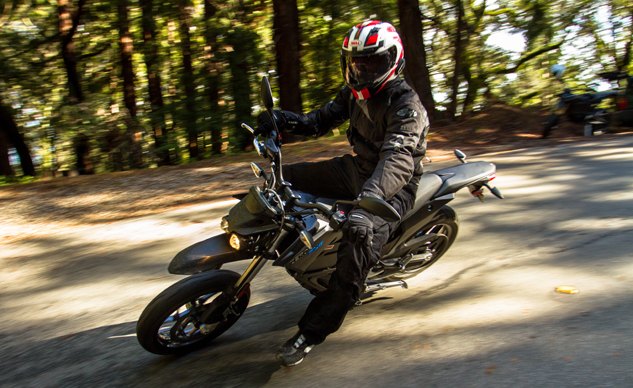
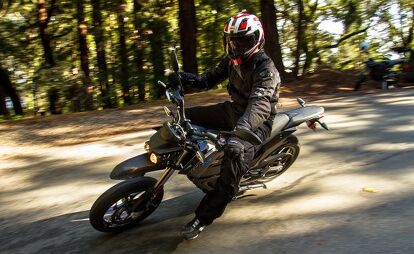































































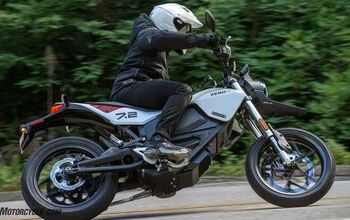
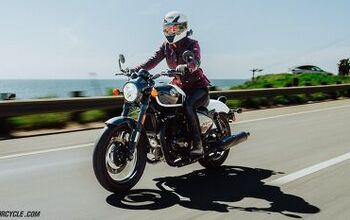







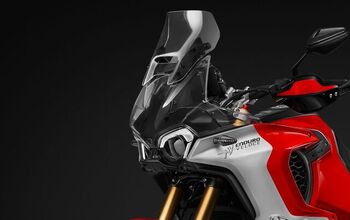
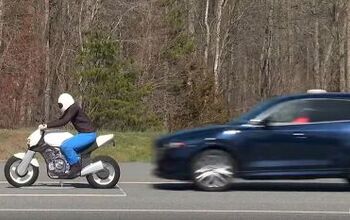


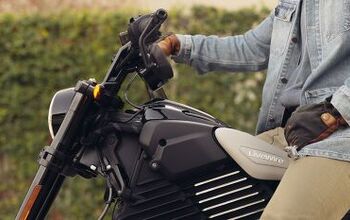
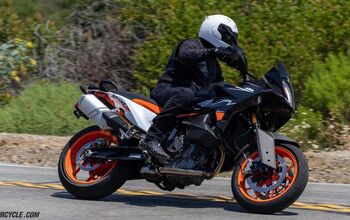
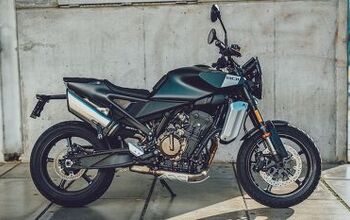


Comments
Join the conversation
If you live in SoCal;and have a shortish 10 to 15 mile commute. Would it be feasible to have a solar array on your roof and a spare battery pack and swap them out daily: Or am I dreaming. Could someone who knows; do the math; please.
Just don't buy an electric bike to save the planet. Climate Change just might be a politically motivated snow job! (Yes, I'll voluntarily appear for my public hanging at noon!)
http://www.wsj.com/articles...